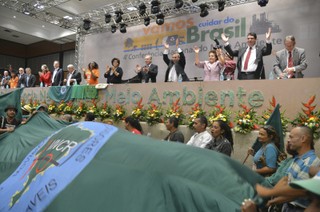Posted by International Alliance of Waste Pickers
Written by MNCR
Region Latin America
November 01, 2013
The 4th National Conference on the Environment, held October 24-27, united 1,200 delegates from civil society, government, and the private sector to discuss the implementation of the National Waste Policy. The National Movement of Brazilian Waste Pickers (MNCR) participated in all the stages of the process, with months of local, state and regional conferences leading up to the main conference. In total, 40,000 waste pickers participated in the process. At the conference, the biggest issue debated was incineration, which contradicts the national waste policy’s objectives of zero waste and social inclusion and reducing pollution. There is a lot of pressure from industry and private waste management companies to promote incineration. According to researchers, incineration is incompatible with recycling. Incinerators need to be fueled by materials that easily catch on fire – namely, plastics and paper. Another controversial theme is that of Producer Responsibility, also discussed in the national waste policy. Waste pickers and activist groups stress that industries of packaging should should pay for the adequate final destination for their packaging.
The opening of the conference was marked by a protest — organized by waste pickers — against incineration and public-private-partnerships and in favor of socially inclusive recycling and recognition of waste pickers. The National Movement put forth three proposals that were approved by conference participants: No public-private partnerships, the development of technologies for socially inclusive recycling, funding and support of organized and independent waste pickers (especially those working in precarious situations on streets and landfills).
Tweet






